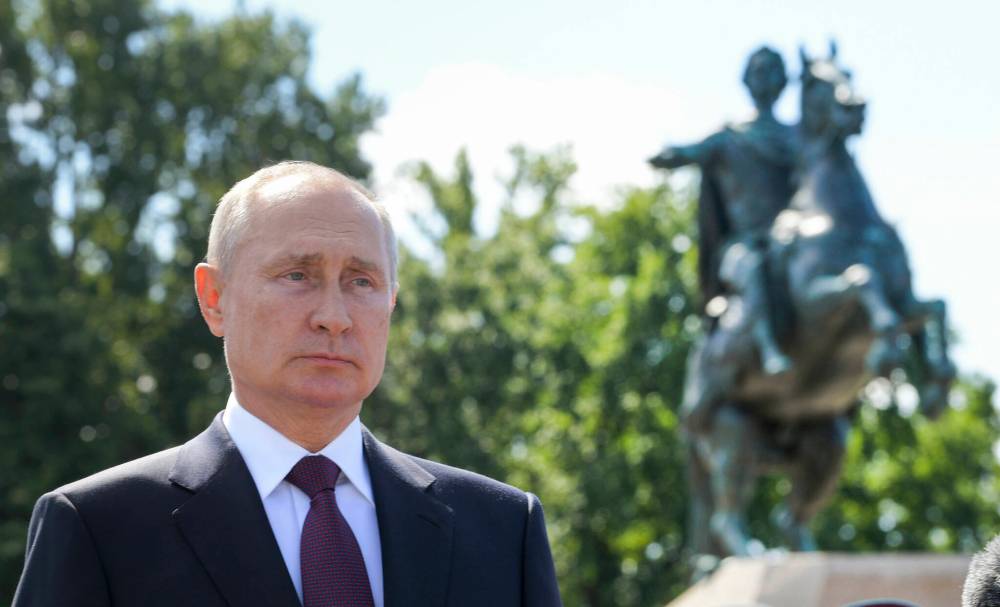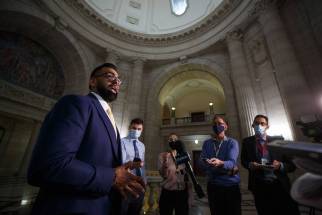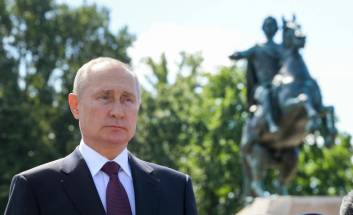Putin’s war won’t end as he envisioned
Read this article for free:
or
Already have an account? Log in here »
To continue reading, please subscribe:
Monthly Digital Subscription
$0 for the first 4 weeks*
- Enjoy unlimited reading on winnipegfreepress.com
- Read the E-Edition, our digital replica newspaper
- Access News Break, our award-winning app
- Play interactive puzzles
*No charge for 4 weeks then price increases to the regular rate of $19.00 plus GST every four weeks. Offer available to new and qualified returning subscribers only. Cancel any time.
Monthly Digital Subscription
$4.75/week*
- Enjoy unlimited reading on winnipegfreepress.com
- Read the E-Edition, our digital replica newspaper
- Access News Break, our award-winning app
- Play interactive puzzles
*Billed as $19 plus GST every four weeks. Cancel any time.
To continue reading, please subscribe:
Add Free Press access to your Brandon Sun subscription for only an additional
$1 for the first 4 weeks*
*Your next subscription payment will increase by $1.00 and you will be charged $16.99 plus GST for four weeks. After four weeks, your payment will increase to $23.99 plus GST every four weeks.
Read unlimited articles for free today:
or
Already have an account? Log in here »
Hey there, time traveller!
This article was published 26/09/2022 (1168 days ago), so information in it may no longer be current.
Men of military age were queueing up at the borders of Russia this week, fleeing the country before they could be conscripted to go to Ukraine and join President Vladimir Putin’s war of conquest against neighbouring Ukraine.
Mr. Putin has announced a partial mobilization of reservists to strengthen his army, which has been retreating from parts of Ukraine back toward the Russian border.
The partial mobilization provoked demonstrations and turbulence in Russia. A conscription candidate in a small town in Irkutsk shot and wounded the chief recruitment officer in a recruiting station. At Ryazan in western Russia, a man set himself on fire to protest the war in Ukraine.
Protests broke out in ethnic minority regions such as Dagestan, Buryatia and Yakutia. More than 2,300 protesters have been arrested in dozens of Russian cities since the mobilization was announced last Wednesday.
Having failed to capture Ukraine’s capital or remove its government, Mr. Putin has concentrated his forces in the regions nearest Russia where he has been supporting low-intensity civil war for the last year and more. Residents were voting at gunpoint in these regions yesterday in an operation Mr. Putin called a referendum on annexation of their districts to Russia.
Mr. Putin cannot by these means win international recognition for annexation of the Crimea and the Donbas and Luhansk regions of Ukraine.
Mr. Putin cannot by these means win international recognition for annexation of the Crimea and the Donbas and Luhansk regions of Ukraine. If, however, he withdrew his troops and ordered separatist forces in those regions to stop waging war against Ukraine, he might then open the way for a negotiated settlement.
As part of such a settlement, an honest referendum under international supervision might be held. This could allow residents of those regions to express their views without coercion and without fear. This might lead to an orderly and peaceful redrawing of boundaries with international approval.
Partition of Ukraine in this way could be a solution that would end the eight-month-old war. The Kyiv government of Ukraine should not insist on ruling the country’s eastern regions if their people genuinely want annexation to Russia.
Mr. Putin would also have to abandon other war aims. He cannot expect to block Ukraine from joining the North Atlantic Treaty Organization and the European Union, because that is none of his business if the government and people of Ukraine want to attach themselves to western Europe in that way.
ALEXEI DRUZHININ / KREMLIN POOL PHOTO Russian President Vladimir Putin
The Russian president is clearly in a weak position at the moment. His army has failed to defeat Ukrainian forces. His own people are rising in rebellion against him because he is trying to drag more of them into a war they don’t want to fight.
The forces that could drive him from power are already on the loose in Russia. He needs to end this war quickly because he cannot win it on the battlefield. A negotiated peace is his surest way to remain in power.
Steady political support from Canada and other western powers – together with an adequate supply of weapons – has helped bring Ukraine this far in its struggle with Russia. Continued support will be needed to help the country and its courageous government to withstand Mr. Putin’s continuing attempts to revive the former Soviet empire and imprison Ukraine inside it.
Canada and its allies should be happy to see a negotiated conclusion that allows Russia to resume normal trade in oil and gas and allows Ukraine to ship its abundant grain crops to customers in Africa and the Middle East.
















